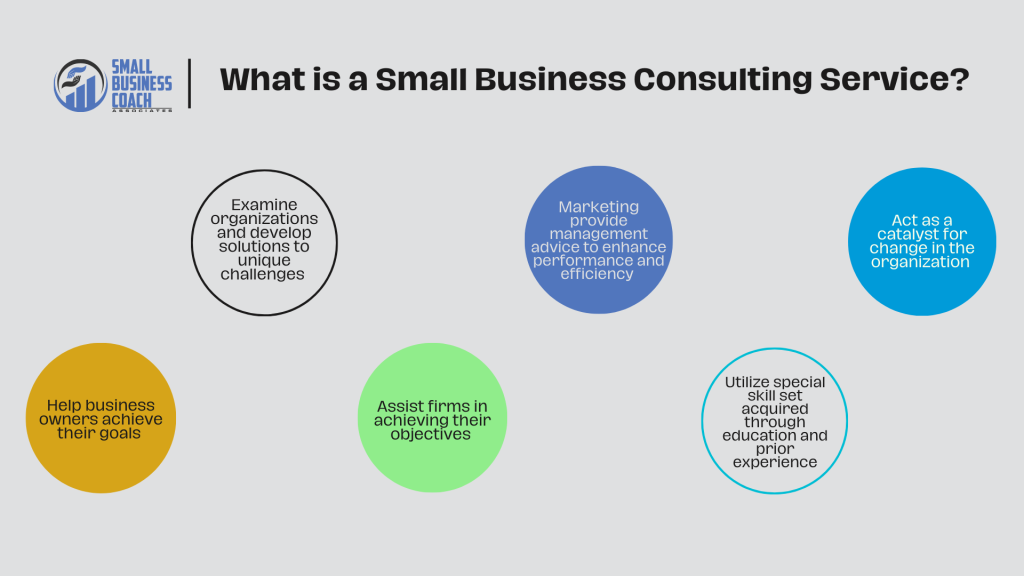VIEW BY TOPIC
- Finding Customers
- Business Systems
- Managing Employees
- Leadership
- Managing Money
Related Posts

Ready to Grow Your Business Fast?
Here’s How I Grew Five Businesses, and Eventually Sold One to a Fortune 500 Company.

Small Business Consulting Services – Quickly Identify The Best
Small Business
Consulting Services
Small business consulting services can be an invaluable asset to your company, helping you to reach your full potential. With the right consultant, you can improve performance and make necessary adjustments for success. Small business consultants can assist in overcoming setbacks, increasing revenue, and expanding operations – all essential factors for a successful venture. Before hiring a small business consulting service, ensure your consultant has the necessary experience and qualifications to help businesses like yours reach your desired outcomes.
Making this investment in a small business consulting service is an integral step towards ensuring that your company can thrive today and well into the future. Let the professionals help you find success.
In this article, we will be covering small business consulting services – what it is, what they do, and how you can find a small business consultant for your business.
What is a small business consulting service?
A business consultant is one who assists business owners with their goals and has a unique skill set gained via education and prior experience. Business consultants can also help firms enhance their performance and efficiency by providing management advice. These individuals examine organizations and develop solutions to unique challenges, while also assisting firms in achieving their objectives. When business owners require assistance or perspective on their chosen course, or a catalyst for change in their organizations, they might consider employing a small business consulting service.

What is the role of a small business consulting service?
A small business consultant assists business owners in developing business plans, identifying marketing needs, developing marketing strategies, and imparting skills to improve management and efficiency in order to maximize earnings. As a result, they play an important role in the expansion of businesses.
Business consultants, to be more exact, are frequently connected with the following responsibilities:
1. Information Exchange
This typically explains why people seek out small business consulting services in the first place: they need information. Surveys, cost and feasibility studies, market surveys, and other techniques can be used to gather necessary information. The small business consultant brings to the table specialized knowledge as well as more current (up-to-date) information that can benefit the company. If the organization is unable to commit any of its resources to data collection internally, business consultants may be recruited. Data is everything in today’s ever-expanding technology environment, and small business consultants can collect it to help their clients build their businesses.
2. Solving Issues
Small business consulting services are usually able to solve complex challenges, and business owners and managers regularly turn to business consultants for help. This could include questions about purchasing a component for the business, acquiring a business line, strategies for restructuring the company’s organizational setup, determining appropriate financial policies to adopt, determining the most appropriate approach in dealing with compensation and morale issues, management succession, efficiency, and so on.
Attempting to solve these kinds of difficulties is undeniably a legitimate duty that ought to be compensated. However, the small business consultant must subsequently discover answers to such difficult issues. He or she must first evaluate whether the problem is one that needs to be solved. Rather than acting on synthesized problem statements, the small business consultant may need to assist in defining the underlying issue. The small business consultant may ask the following questions to learn more about the problem’s context:
- What specific solutions have been tried to address the problem in the past? What were the outcomes of the solutions that were used?
- What are the client’s ideas for solving the problem that haven’t been tried yet?
- What components of the business aren’t doing well?
- If a solution to the problem is developed, how will it be implemented in the business?
- What steps will be taken to guarantee that the developed solution is accepted?
A small business consultant should not just accept or reject the business owner’s statement of the problem. Instead, he or she should examine the situation in a methodical manner and determine whether or not the business owner’s original evaluation is correct.
3. Diagnosis that works
The ability to successfully diagnose accounts for a significant portion of the value of a small business consultant. The diagnosis process can sometimes put a strain on the management-consultant relationship, because the small business consultant may find deficiencies in the company’s management, leading to blame.
Accurate diagnosis isn’t restricted to the company’s external environment, technology, economics, or employee behavior. The causes behind specific choices and decisions that appear to be blunders may also be probed by the small business consultant’s diagnosis. Such investigations will also look into activities that were judged inconsequential and thus were not taken.
4. Recommendation for Action

A written report or oral presentation describing the business consultant’s lessons and some recommendations to the business is usually provided at the end of a small business consulting engagement. It’s critical that reports and data are presented in a way that makes them easy to understand and use. The above recommendations are based on the business consultant’s diagnosis. In most circumstances, the small business consultant’s job isn’t done until he or she has produced a consistent, logical plan of action with measures to address the identified issues. It is the job of the small business consultant to make recommendations, but it is the responsibility of the business owner to put those recommendations into action if he or she so chooses.
5. Implementing Changes
The business consultant gives a fresh perspective to the company and may play a key role in executing change. Now, the degree of flexibility for carrying out this duty may vary, as some firms may prohibit this function of the small business consulting service because it may be seen as infringing on management responsibilities. Being a proponent of recommendations for the business’s growth, on the other hand, implies implemented recommendations, which puts the small business consultant in the role of implementer rather than just recommender.
6. Building Commitment and Consensus
The success of proposed recommendations and diagnoses is determined by team members’ willingness to agree on the nature of problems/opportunities and come up with appropriate remedial activities, lest the diagnosis be rejected and recommendations be ignored.
A small business consultant is critical in motivating commitment and consensus around identified issues and recommended solutions. As a result, the small business consultant is persuasive and has fine-tuned analytic skills, which are required for eliciting consensus on necessary measures to be taken and building the momentum (zeal) to see these agreed-upon activities completed.
7. Improve your management skills
Small business consultants have the ability to improve a business owner’s ability to deal with immediate concerns as well as teach them strategies and procedures for dealing with future obstacles. This isn’t to say that when business owners gain these talents, they become obsolete. Instead, satisfied business owners will always refer and promote such small business consulting services to others, hence expanding the area of influence of the business consultant.
8. Improving Organizational Performance
The implementation of new ideas and objectives necessitates new management skills as well as a fresh viewpoint, which business consultants provide. Small business consultants assist organizations in achieving organizational performance by bringing the ability to adapt future strategy and behavior to environmental change while maximizing available human resources. This keeps the company current in an ever-changing world.
Types of Small Business Consulting Services
In general, there are five categories of small business consultants, each of which can provide value to your business domain. They are as follows:
1. Management and strategy
These small business consultants can help your company scale, obtain new prospects, and generate income by bringing industry expertise to the table. Small business consultants who specialize in strategy and management can assist your company in expanding into new markets or raising awareness in existing markets.
- Creating a cost-effective strategy by reorganizing your business model.
- Increasing the capabilities of your company.
- Getting a new company venture off the ground.
- Changing the structure of your company or merging with another.
- Taking on the role of middle management at a period of transition.

2. Operations
Small business consultants who specialize in operations can assist business owners in improving the quality of their day-to-day processes. These business experts assess your present business model and determine the most cost-effective and time-effective strategy to achieve the same high-quality results at a fraction of the cost and effort. Quality control and understanding how to alter and optimize your production for better results are two more ways these consultants may help.
3. Financial
A financial consultant can show you the bigger picture of your company’s financial health. They mostly assist investors and business owners in determining the best strategy to manage their assets and debts. Financial consultants can also provide additional services, such as financial planning, in which they advise customers on taxes, daily spending, and retirement plans.
4. Human Resource
There are a variety of HR consulting organizations and freelancers who can help business owners with their HR needs. These consultants can handle day-to-day HR responsibilities like hiring and retaining new employees, payroll management, administrative tasks, and performance management.
5. Marketing
Marketing consultants assist firms in identifying and expanding on their brand’s strengths in order to increase brand awareness and visibility. A marketing consultant may help you improve your business’ reach, whether you need a new logo or a social media plan.
How to Locate A Small Business Consultant?
You can go on to the exploration step once you’ve defined the area where you need assistance. It may be difficult to discover the proper small business consultant for your needs, but there are several areas you may look into, such as:
- Investigate Consulting Networks on Google
- Make the Most of Your Personal Network
- Industry Events to Attend
- Participate in Online Communities
- Examine Online Advisors
Are you in need of small business consulting services? Then contact our certified small business consultant today. Click here to book a free strategy session here.
1. Do a Google search on small business consulting services.
You might look for terms like “management consulting for small firms” that are relevant to the company difficulties you’re trying to solve. Google is the quickest method of obtaining contact information. However, this will mostly identify small business consulting services with sufficient resources and motivation to pay for AdWords advertisements and heavily invest in SEO. Individual consultants and mentors may not be applicable.
SO, while this is a good starting point, you can supplement your list with the methods described below.
2. Check Out Small Business Consulting Groups
Clarity is a consulting network with a few thousand members who specialize in a variety of fields. Another choice is OnFrontiers, and there are a couple of smaller ones as well.
Mentorship communities and groups also exist. Small business bureaus are also available. This strategy is effective in niches where membership is virtually “required” and consultants apply and participate frequently.
The benefit of similar consulting networks is the ability to instantly contact a small business consultant without having to go through a lengthy “interviewing” process, contract signing, or arduous negotiations. You can literally call the next day and get started on your case.
3. Make the Most of Your Network

Potential business alliances may be discovered by tapping into your existing network. The circle of “friends and family” is a good place to start; partners, vendors, and other industry peers. When in doubt, ask on Facebook, Twitter, or LinkedIn; someone may be able to provide a referral who can assist.
It’s likely that you’ll be able to contact someone who has appropriate knowledge in this industry and is willing to work with you or connect you to someone they know.
This is when the rule of “top of mind” comes in helpful. When they think of a specific industry or a problem, some of your colleagues will propose the go-to person.
4. Industry Events to Attend
Meetups and seminars are popular gathering places for local small business consultants. Some give talks, some network, and yet others sponsor or assist other clients.
Even if you are unable to locate a consultant there, event organizers or volunteers may be able to assist you. A tiny group of people work as “networkers,” connecting different vendors with one another. You can spot them by the steady flow of exchanges and talks with everyone in the hall.
When it comes to finding niche experts, events are extremely effective. At comparable events, the majority of industry leaders speak. Alternatively, their employers may fund them. Or it’s where they regularly meet up with old friends, colleagues, and partners.
5. Participate in Online Communities
Whatever works in your field: social media, Quora, forums, Facebook groups, etc. Many people use Quora to promote themselves or their businesses. On Facebook, industry groups bring together all kinds of people, including small business consultants and advisors.
Quora is so effective that you can even connect with and pitch investors through it.
LinkedIn is also a good place to look for small business consulting services. If Twitter is a network you use sporadically, some people put a lot of money into it.
For seasoned and competent small business consultants, their online reputation is crucial. You can locate some great talent there if you use the appropriate search filters and join the right business groups.
6. Mentors and indirect small business consulting
People frequently overlook the source of the information they get on a daily basis from the internet.
In your browser, go to the History tab. Sift through the last 30 posts you’ve read to see what you’ve learned. Who penned them? Thousands of contributors work for sites like Forbes, Inc., and HuffPost. Look them up on social media or on their websites. Some of them are likely to provide small business coaching services; if you’ve benefited from their counsel, consider reaching out to them.
How to choose a small business consulting service to hire
Many people try to market small business consulting services without actually understanding what they are consulting on. It’s time to discover how to evaluate consultants after you’ve done your research and potentially made a list of potential consultants. Here’s a short checklist just for that: References, background, and public appearance.
Are you in need of small business consulting services? Then contact our certified small business consultant today. Click here to book a free strategy session here.
1. Look up References
This can include their client portfolio, CV, case studies, or recommendations from others in your network.
LinkedIn suggestions may be useful, but they are usually more optimistic than practical. However, 40 or more positive ratings for an advisor or consultant are quite rare.
Their curriculum vitae should show that they have worked in their respective fields.
Case studies can assist you in determining what they do, what they specialize in, and the types of problems they handle (including their strong areas of expertise which vary across consultants).
The power of being recognized in podcasts and guest pieces (or interviews) is undeniable. The same can be said for writing a book or hosting a podcast on the subject.
2. Do a background check on the small business consulting service
With only a few years of experience in the area or even after an MBA, it’s not uncommon for young people to offer consultancy guidance.
Needless to say, this will not provide the desired results. Sure, a small business consultant could have spent 15 years in the same company, with a limited understanding of the larger ecosystem, or even in a completely different area.
However, having worked with a variety of clients on varied projects allows you to validate your knowledge and change your approach across enterprises.
3. Consider public appearance.
Most small business consultants are involved in some type of public relations, branding, or marketing. This includes the following:
- Speaking in front of an audience (presenting at conferences, teaching courses)
- Appearances on television or radio, as well as podcasts
- Marketing with content
- Posts by visitors
- Interviews
- Books created in collaboration
The most challenging component for the owner or management may be finding the right small business consulting service. The small business consultant should be enthusiastic about their work, have a strong desire to succeed, and have a keen sense of organization and detail. It’s critical to choose a small business consultant with experience in your field or with the types of difficulties your company faces. Check to see if they have any reliable recommendations.
In addition, check to see if the small business consultant has any relevant certifications for your field. You should check out the consultant’s website and resources. Examine their services for professional photos and well-documented material, as well as contracts and consulting rates. It’s a good idea to ask for examples of previous accomplishments and chat with such companies.
How much do small business consulting services charge?
Management consultants earn an average of $150,000 per year, according to the Bureau of Labor Statistics. However, that is the amount of money that the employee “takes home,” and consulting fees are often larger to cover business expenses. Small business consultants don’t necessarily work on an hourly basis. According to Consulting Success’s consultant fee survey, the following are some of the most common fee schemes and the percentages of consultants that choose them:
- Per project – 34.2%
- Hourly – 27.3%
- Monthly retainer – 15.1%
- Daily rate – 14.1%
- Other – 9.3%
According to the report, 43% of consultants earn less than $5,000 each assignment, with some earning more than $100,000. Obviously, the cost is determined by the project’s size, scope, and duration.
Small business consultants can be costly, but their advice and planning can help you grow your firm and earnings while also identifying difficulties and chances for future success.
Are you interested in hiring a small business consulting service? Do you desire your business to attain a height of progress and success unlike never before? Then, book a free strategy session with our certified small business consultant today. Find out more here.














